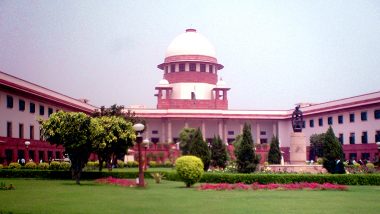New Delhi, May 16: The Supreme Court on Wednesday said that no one can be arrested without adoption of a fair procedure and that not even Parliament can make such a law, insisting that Article 21 of the Constitution on right to life and liberty has to be read in every provision of law having a bearing on the liberty of people.
"No Parliament can allow the arrest without the fair procedure," said a bench of Justice Adarsh Kumar Goel and Justice Uday Umesh Lalit while pointing out that the principle of reasonableness propounded in the Maneka Gandhi case is applicable to all situations.
"If a person can be put in jail without a fair procedure, then it is just that we are not living in a civilised society," said Justice Goel.
The court was hearing the Centre's plea for recall of its March 20 judgment wherein it said that there would not be the arrest of a person against whom a complaint has been filed under the Scheduled Castes and the Scheduled Tribes (Prevention of Atrocities) Act without a preliminary inquiry.
The bench, by the said judgment, had issued several directions for preliminary inquiry before an FIR is lodged and action is taken on a complaint about atrocities under the Act.
The court said that the goal of a just society and fair procedure go together and can't be seen separately and that no one can be arrested without a fair procedure and even Parliament can't frame such a law.
The court's observation came as Attorney General K.K. Venugopal tried to impress upon the court that what has been said in the judgment amounted to reading law into an existing statue, which can't be done.
The AG said that the top court can fill in the gaps in an existing law but can't add to its provision that has a bearing on its working. To buttress his point, the Attorney General took the court through its judgment in the Supreme Court Bar Association vs Union of India case.
Justice Lalit pointed to the complete machinery that was created by the top court for scrutinising the claim of a person seeking benefits of reservation under the SC/ST category.
As Venugopal said that he would require some more time to complete his arguments and Additional Solicitor General Tushar Mehta said that he would require three hours to place his case before the court, the hearing was adjourned to after the summer vacations starting from Monday.
In the last hearing on May 3, the Attorney General had told the bench that its judgment amounted to an exercise in law-making.
He urged the court to refer the matter to a larger bench on the question whether the top court can issue directions, guidelines or mandamus contrary to the provision of existing laws.
The Centre has said that the March 20 judgment was contrary to the provision of the SC/ST Act and amounted to whittling down of the stringent provisions.
The central government moved the top court for a review of its March 20 judgment that had led to protests, including by lawmakers, who felt that the Supreme Court verdict had diluted the Act.
(The above story first appeared on LatestLY on May 16, 2018 08:18 PM IST. For more news and updates on politics, world, sports, entertainment and lifestyle, log on to our website latestly.com).













 Quickly
Quickly


